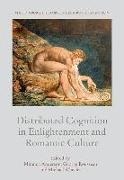Read more
The first systematic application of theories of distributed cognition to this historical period This collection brings together eleven essays by international specialists in Enlightenment and Romantic culture and provides a general and a period-specific introduction to distributed cognition and the cognitive humanities. The essays revitalise our reading of the era's works in the fields of archaeology, history, drama, literature, art, philosophy, science and medicine, bringing to bear recent insights in cognitive science and philosophy of mind on the ways in which cognition is distributed across brain, body and world. Collectively the essays in the book demonstrate the ways in which the particular range of sociocultural and technological contexts that existed during the long eighteenth century fostered and reflected particular notions of distributed cognition. Miranda Anderson is an Anniversary Fellow at the University of Stirling and an Honorary Fellow at the University of Edinburgh. George Rousseau is Emeritus Professor of History at the University of Oxford. Michael Wheeler is Professor of Philosophy at the University of Stirling.
List of contents
List of illustrations
Series Preface
1. Series Introduction: Distributed Cognition and the Humanities
Miranda Anderson, Michael Wheeler and Mark Sprevak
2 Introduction I: Distributed Cognition in Enlightenment and Romantic Studies - An Overview
George Rousseau
Introduction II: Distributed Cognition in Enlightenment and Romantic Studies - Our Volume
Miranda Anderson
3. The Delicate Flux of World and Spirit: Barthold Heinrich Brockes and Distributed Cognition
Charlotte Lee
4. Wordsworth, Keats, and Cognitive Spaces of Empathy in Endymion
Renee Harris
5. The Body's Own Space: Embodied Cognition in Berkeley and Kant
Jennifer Mensch
6. Is Laurence Sterne's Protagonist Tristram Shandy Embodied, Enacted or Extended?
George Rousseau
7. Enacting the Absolute: Subject-Object Relations in Samuel Taylor Coleridge's Theory of Knowledge
Lisa Ann Robertson
8. Cognitive Scaffolding,
Aids to Reflection
John Savarese
9. The Self in the History of Distributed Cognition: A View from the History of Reading
Elspeth Jajdelska
10. 'Thoroughly to unfold the labyrinths of the human mind': Distributed Cognition and Women (Novelist)'s Representation of Theatre in Eighteenth-Century England.
Ros Ballaster
11. The Literary Designer Environments of Eighteenth-Century Jesuit Poetics
Karin Kukkonen
12. Blake and the Mark of the Cognitive: Notes Towards the Appearance of the Skeptical Subject
Richard Sha
13. Eighteenth-Century Antiquity: Extended, Embodied, Enacted
Helen Slaney
Notes on contributors
Bibliography
About the author
Miranda Anderson is an Anniversary Fellow at the University of Stirling and an Honorary Fellow at the University of Edinburgh. Her research focuses on cognitive approaches to literature and culture. She is the author of
The Renaissance Extended Mind (Palgrave Macmillan, 2015). George Rousseau is a Cultural Historian and a Fellow of the Royal Historical Society. He taught at Harvard for many years, was Professor at UCLA, Regius Professor at King's College Aberdeen and was Co-Director of the Centre for the History of Childhood at Oxford University until 2013. His books centre chronologically in the Enlightenment and usually include medicine, science and sex as primary to their concerns. Michael Wheeler is Professor of Philosophy at the University of Stirling. He is the author of Reconstructing the Cognitive World: The Next Step (MIT, 2005). He is co-editor of Heidegger and Cognitive Science (Palgrave, 2012) and The Mechanical Mind in History (MIT, 2008).
Summary
Essays by 12 international specialists in Enlightenment and Romantic culture. This collection looks at the ways in which cognition is explicitly or implicitly conceived of as distributed across brain, body and world in Enlightenment and Romantic science, medicine, philosophy, art, literature and drama.

